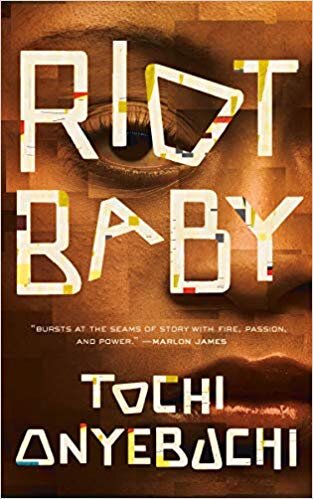For Black History Month, some favorite short stories and novels by new and classic black SF/F writers.
Read moreFor Those Who Dream of Fire: “Riot Baby” by Tochi Onyebuchi, Reviewed
Riot Baby by Tochi Onybuchi cover art features a close-up photo of the face of a young black woman with the title jumbled across it. Cover design by Jaya Micele. Cover photo © Getty Images.
Reader be warned: Riot Baby by Tochi Onyebuchi, coming out from Tor.com, is not for the faint of heart. That said, you should definitely read it. This book is violent because the lives of the children of Compton in the ‘90s were violent. Whenever a book opens with violence told nonchalantly, you have to know you are in for a lot of it. If you liked HBO’s Watchmen, you will also enjoy Riot Baby. The book opens with a scene on a school bus with the kids inside throwing Crip signs at the Bloods on the street. When a Blood boards the bus and holds a gun to a kid’s head, we see that our narrator, Ella, is an astute observer of her world.
“Ella can see in the gangbanger’s eyes that he’s got no compunctions about it, the guy would meet disrespect with murder.”
This is the reality of Ella’s world. Ella’s not only a keen observer; her powers are supernatural and continually unfold throughout the book. When we first meet her, we see that she can perceive the future for herself and for others. This ability comes at a cost—she not only experiences the emotional trauma of seeing people dying around her but also feels it physically. Coming from a neighborhood where violence is quotidian, this is a heavy burden for Ella to bear.
Onyebuchi’s language is spare but there is poetry in the beauty of his observations and in the way he renders relationships.
“Brother Harvey says a prayer for all of them; then he sends them back out to their parents or grandparents or people who act like their parents because they need to.”
The absence of family stability is clear but so too is the way the community comes together to take care of each other. There is love in this hard place. Ella’s family is no exception: her biggest source of stability is a woman she calls grandmother, though they are not related, and the love between them is big. She has an unreliable extremely religious pregnant mother. She does not have a father. She has some friends and connections, but she is a lonely character because of her powers, which her family demands she keep secret, and the foreknowledge that she will always be leaving.
The story is set against the backdrop of violence perpetrated against black communities in America. The first time marker is the police beating of Rodney King in 1991, which set off the L.A. Riots. Ella’s brother, Kev, a.k.a. Riot Baby, is born as the chaos begins. When the family emerges from the hospital, they see their city burned to the ground. Other markers include the police murder of Sean Bell, Oscar Grant III, Walter Scott and the Charleston Church shooting. He also seems to allude to the shooting of Tyrone Harris Jr. at the Michael Brown anniversary protest, though I wasn’t sure. (I’d be interested to hear from anyone more well versed in the topic as not all events are given names.) Riot Baby moves through Compton, Harlem, Rikers and Watts, and the violent incidents carry us from 1991 to 2015 through the terrifying America we know and then moves into a speculative future of the America we might get.
This book touches on a theme I have been curious about for a long time and that is the notion of freedom. How much do we actually have? What makes a person feel free? Something that I love about genre literature is the capacity it has for tackling big questions and for dealing with villainy at the systemic level. This book does both beautifully.
“Prison’s weird like that. All types of absurd shit happens here, and you just need the patience to step back and watch it happen. Maybe that comes with time. Maybe not. Maybe you spend your entire sentence here getting the shit kicked outta you. Maybe they kill you in here. But maybe you make it out. Not from behind bars, but out of wherever it is they try to put you when they put you behind bars.”
This book is great for readers who are looking to learn about the modern oppression of Black Americans while reading an entertaining story about siblings, power and freedom and whether the right course of action is just to burn it all down.
Riot Baby is available now for pre-order. Get it from your local bookstore in person or online. Or, if you must, the evil empire will certainly have it too.












Cadwell Turnbull's new novel — the first in a trilogy — imagines the hard, uncertain work of a fantastical justice.